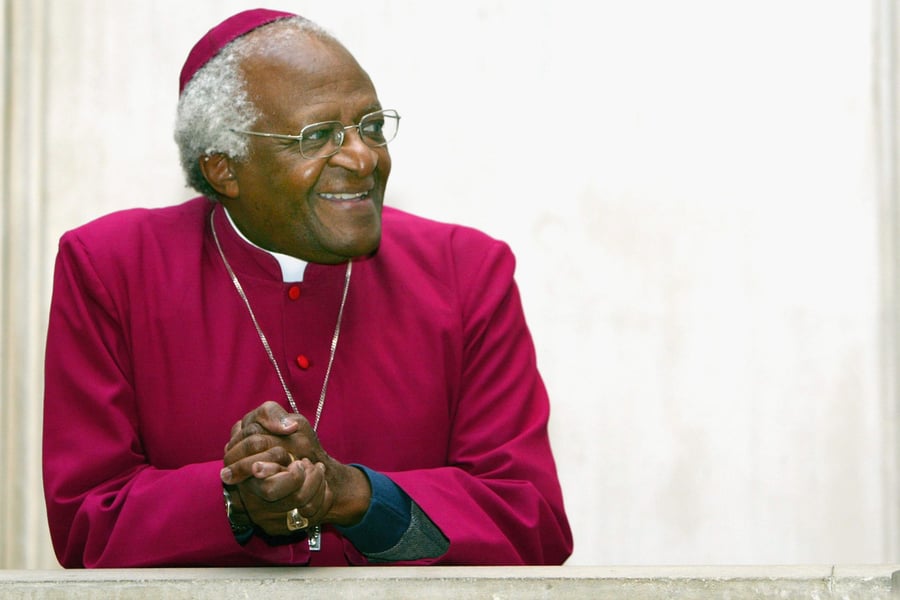South African Archbishop Desmond Tutu, an international symbol for racial justice and human rights for decades, has died, South African President Cyril Ramaphosa announced Sunday. He was 90 years old.
“The passing of Archbishop Emeritus Desmond Tutu is another chapter of bereavement in our nation’s farewell to a generation of outstanding South Africans who have bequeathed us a liberated South Africa,” Ramaphosa said in a statement.
Tutu committed himself to ending apartheid, the South African system of oppression of its Black majority. In 1975, he became the first Black bishop of Johannesburg, the nation’s capital, and later the first Black archbishop of Cape Town. He used those platforms to shape public sentiment against racial inequality not just within his own country, but around the world. In 1984, he was awarded the Nobel Peace Prize.
The fall of apartheid in 1994 and the country’s first democratic elections transformed South Africa into a “rainbow nation,” Tutu declared. He shared a close bond with fellow Nobel laureate Nelson Mandela, who called him “the people’s archbishop.” Mandela, South Africa’s first Black president, appointed Tutu chairman of the Truth and Reconciliation Commission, which laid bare apartheid’s abuses.
Later in life, Tutu turned his focus to LGBTQ rights and the environment.
“I would not worship a God who is homophobic and that is how deeply I feel about this,” he said in 2013 while launching a campaign in Cape Town. “I would refuse to go to a homophobic heaven. No, I would say, ‘Sorry, I would much rather go to the other place.’”
The next year, Tutu called for a boycott and disinvestment campaign against the fossil fuel industry, citing its contributions to climate changer. Tactics used to fight apartheid, he urged, must similarly be deployed in order to resist the forces of greed and the unmitigated consumption of natural resources.
“From the pavements of resistance in South Africa to the pulpits of the world’s great cathedrals and places of worship, and the prestigious setting of the Nobel Peace Prize ceremony, the Arch distinguished himself as a non-sectarian, inclusive champion of universal human rights,” Ramaphosa continued in announcing Tutu’s death.
“He felt with the people,” current Cape Town Archbishop Thabo Makgoba added in his own statement. “In public and alone, he cried because he felt people’s pain. And he laughed — no, not just laughed, he cackled with delight when he shared their joy.”
Former President Barack Obama, likewise a recipient of the Nobel Peace Prize, wrote on Sunday that Tutu had been “a mentor, a friend, and a moral compass for me and so many others.”
He never lost his impish sense of humor and willingness to find humanity in his adversaries, and Michelle and I will miss him dearly.
— Barack Obama (@BarackObama) December 26, 2021
Reaction from other world leaders and notable figures poured in throughout the morning.
I am deeply saddened to hear of the death of Archbishop Desmond Tutu.
He was a critical figure in the fight against apartheid and in the struggle to create a new South Africa – and will be remembered for his spiritual leadership and irrepressible good humour.
— Boris Johnson (@BorisJohnson) December 26, 2021
I’m so sad that Archbishop Tutu has passed away – the world has lost a giant. He was a brave leader, a mischievous delight, a profound thinker, and a dear friend https://t.co/YYBh6RYhUz
— Richard Branson (@richardbranson) December 26, 2021
“God is not a Christian. God accepts as pleasing those who live by the best lights available to them that they can discern. All truth, all sense of beauty, all awareness of goodness has one source, God, who is not confined to one place, time or people.” – Archbishop Desmond Tutu pic.twitter.com/up1o42Hetj
— Ava DuVernay (@ava) December 26, 2021
“With his passing away, we have lost a great man, who lived a truly meaningful life,” the Dalai Lama wrote in a statement. “He was devoted to the service of others, especially those who are least fortunate. I am convinced the best tribute we can pay him and keep his spirit alive is to do as he did and constantly look to see how we too can be of help to others.”
From Rolling Stone US






































